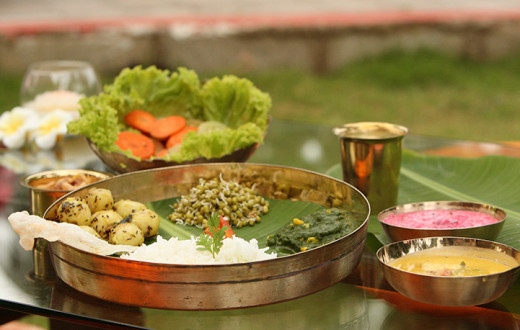The beats were snazzy and snappy. The drum roll, the twang of the electric guitar and the synthesizer keeping up. Heads were banging, and everybody seemed to move with their expression of the rhythm within. A slow voice began singing words which most were unable to understand. But as they say, music has no boundaries and the slow swaying and the conversations continued. “That felt really good,” shared someone after the rock concert was over. It was only much later that we realized: haven’t we heard those lyrics before? At a temple, at home, at prayer meets? They didn’t seem to feel that ‘good’ at the time. In fact, some of them tread quietly on, unnoticed. Ubiquitous Sanskrit lines that seem difficult to pronounce, and comprehend. Something that can be skipped until we reach more relatable English or Hindi lyrics.
Kim bhoho - hey, what’s up!
Contrast this to a few years later. Same swag, familiar drum rolls, completely relatable dancing and conversations. And people shouting the words as the band belts out melodious numbers. This time, the crowd seems to have the ability to remember the words, if not completely understand them. The language is still Sanskrit, and music still has no barriers.
A growing appreciation for the language’s nuances seemed to have overtaken the fear people had for its formidable-sounding pronunciations. Now, it’s almost the new-cool. Kim bhoho, people!
Yet, try as one might, the ocean of Sanskrit proverbs and sayings is vast and deep. You could perhaps touch your toe and get your feet wet, yet where do you begin to swim in its ancient waves?
Here, we promise to help. This is not a comprehensive list. Neither is it a representative one. We are secular. However if you do not appreciate the choice of sayings below, kindly do not voice the same. We did not author these beautiful sayings. Instead request you to dive deep into the beauty of the sentiments. We promise you will be amazed at the finesse of words and thought.
In an age of affirmations, visualizations, prepping one up with positive self-talk, these sayings and shlokas are surprisingly refreshing. There is an acknowledgment of a higher power that exists in our daily life, an interconnectedness of all things, a mystique in our existence. And an unshakable realization of humans possessing divinity within themselves while playing a little role in the larger Cosmic design. These aspects are not spoken about, yet clear in its outline.
Sample a few:
1. Greetings: A dignity and respect in simple hello-equivalents.
* Namaste: The divinity in me bows to the divinity in you.
* Jai Guru Dev: Victory to the big mind (wisdom) and little mind (playfulness, child-like) in you.
2. Good-bye: We usually say goodbye, take care or a see you soon. You might want to try this: Shivaasthe Panthaanaha.

This translates to ‘let your ways be auspicious’. ‘Ways’ here would also represent paths, deeds, and ways of life.
3. Waking up in the morning: While our instinct is to check the phone and get accosted with messages, our ancients did something different. They would lightly cup their palms, look at them and recite:
Karaagre Vasate Lakshmih Karamadhye Saraswati
Karamuule Tu Govindah Prabhaate Karadarshana
This roughly translates as: ‘Goddess Lakshmi dwells on my fingers, Goddess Saraswati dwells in my palms, while Lord Govinda dwells on my wrists. I pay obeisance to these divine energies in my palms in the early hours of morning.’
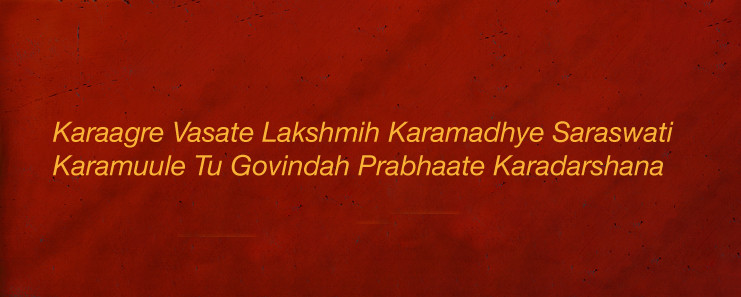
Let my hands do good work. Let me bring good fortune, wisdom and sustain life around me. This is also an interpretation as one would start their day with peace and surrender in one’s heart.
4. While having a bath: In ancient times, the king, saints and the lay people would recite a prayer during snana (bath) which invoked the seven sacred rivers of India.
Gangecha Yamunechaiva,
Godavari cha Saraswati;
Narmada Sindhu Kaveri;
Jale, asmin sannidham kuru.
‘O ye Ganga, Yamuna, Godavari, Saraswati, Narmada, Sindhu and Kaveri Come ye and enter into this water of my offering.’
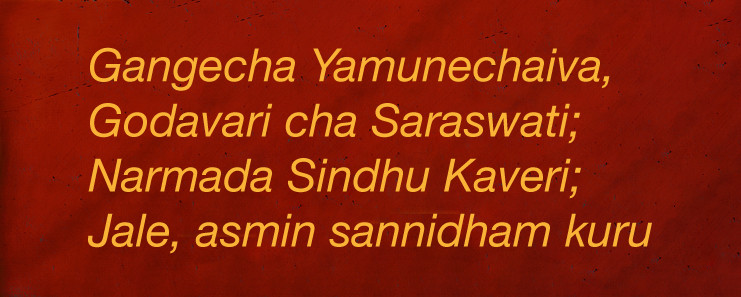
The ancients believed water becomes purified after chanting this mantra, giving sanctity to cleansing the body, a vehicle to reach the higher truths of life.
Today, we often refer to changing the molecular structure of water though chants and affirmations. This mantra is also a quiet reminder of the raging ecological crisis currently. Our rivers are disappearing, getting polluted and are exploited. This little prayer harkens to the times when rivers were worshipped as Goddesses. About time we resumed this practice.
5. On eating: The act of consuming food used to be a slow, contemplative exercise, often in silence. Almost a time to worship the body that toils and has the capability to experience the ultimate union with the divine.
One of the shlokas is the Annapoorna shlokam.
The Sudarshan Kriya and other practices taught in the Art of Living Meditation and Breath Workshop can greatly enhance your soft skills and help you overcome your barriers.
Annapoorne Sada poorne, Shankara Pranavallabhe
Gyana Vairagya Sidyartham, Bhikshaam Dehi cha Parvati
Mata cha Parvati Devi, Pita Devo Maheswarah
Baandava Shiva Bhaktyascha, Svadeso Bhuvanatrayam
A translation: ‘O Annapurna, the ever-fulfilled one, the beloved of Lord Shankara. O Pravati, grant me wisdom and dispassion as alms. You are the Mother to all, Lord Shankara is the father. Lord Shiva’s devotees are my kin and my home encompasses all the three worlds.’
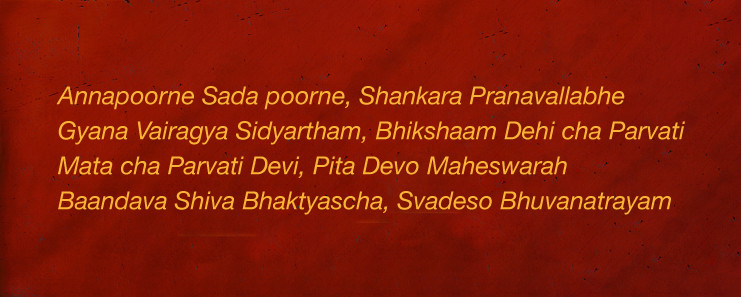
Another shlokas is:
Brahmaarpanam Brahma Havih Brahmaagnau Brahmana Hutam,
Brahmaiva Tena Gantavyam Brahmakarmasamaadhina.
‘A practice of offering is Brahman, the oblation is Brahman, the device of offering is Brahman, and the fire (hunger) to which the offering is made, is also Brahman. For such a one, who abides in everything (Brahman), by him alone Brahman is reached.’
The emphasis is on honoring the divine which bestows food and nutrition, and honoring the body which consumes this food.
The awareness would bring in a relaxation during meal time, an emphasis on eating slowly, taking as much as you need, and making healthy food choices. Habits that many of us are working on developing in today’s insta-rich instant consumption. Sometimes we need to own the pace of life, instead of succumbing to its pressure.
Gurudev Sri Sri Ravi Shankar often says: Say this prayer before or after finishing a meal, Annadata Sukhi Bhava - Let those who provide me with food be happy.
This refers to the farmers who grow the food, the trader who got the food to the market and the person who cooks it.
[Read more: The magical mantra to chant before and after your meals - Wisdom by Gurudev Sri Sri Ravi Shankar]
6. Before starting a team meeting or a new collaboration: Of course, we love competition and the adrenalin-rush of achievement and strife. Yet if you’re looking at not getting swayed by the rush of words, excitement and boardroom drama, then you might want to quietly chant this:
Sahana Vavatu
Sahanau Bhunaktu
Saha Viryam Karavavahai
Tejasvi Navaditamastu
Ma Vidvishavahai
‘Let the divine protect us both. Let us be together. Let us develop our ability together. Let us be effulgent, let our brilliance shine through. Let us not hate each other.’
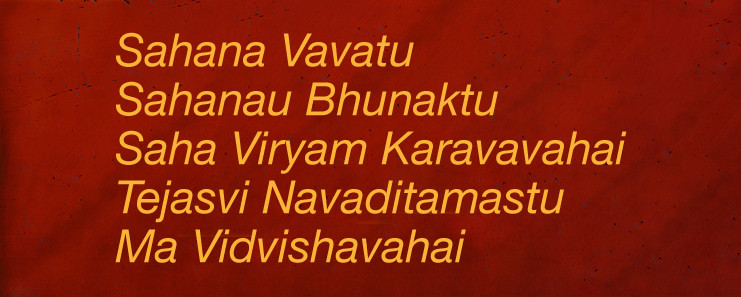
In short, let’s work hard and chill. Not hold any grudges or bitterness.
Lokah Samastah Sukhino Bhavantu is also a beautiful prayer. ‘May all beings everywhere be happy and free, and may the thoughts, words, and actions of my own life contribute in some way to that happiness and to that freedom for all.’
7. A little reminder to remain equanimous: It’s easy to get swayed by success, disappointments, failures - a little reminder to say these poignant words:
Na Punyam Na Paapam Na Soukhyam Na Dukham,
Na Manthro Na Theertham Na Veda Na Yagna,
Aham Bhojanam Naiva Bhojyam Na Bhoktha,
Chidananada Roopa Shivoham, Shivoham
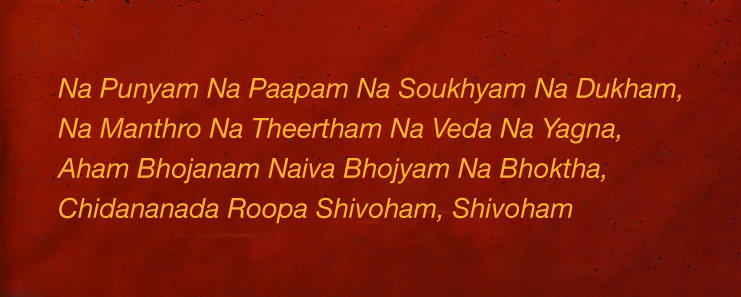
‘Never do I have good deeds or sins or pleasure or sorrow, Neither do I have holy chants or holy water or holy books or fire sacrifice. I am neither food or the consumer who consumes food. I am Shiva, I am Shiva of nature, knowledge and bliss.’
Or this famous shloka which many of us have learnt in school:
Asato ma sadgamaya
Tamaso ma jyotir gamaya
Mrityorma amritam gamaya
Om Shanti Shanti Shantihi
‘Lead me (by giving knowledge) from the unreal to the real; from darkness (of ignorance) to the light (of knowledge); from death (sense of limitation) to immortality (limitless liberation).’
You could choose to chant the Gayatri or the Shanti mantra. Or simply pause in the day and wish well for somebody, and yourself. Pause, reflect, let go and cleanse. Of course, the power of these ancient words resonate with the wisdom of thousands of years. Yet you could choose to make this a part of your routine in your inimitable way. Own it with pride.
Saubhagyam (all the best) on your journey.
We’d love to hear from you. Leave your comments @artofliving































